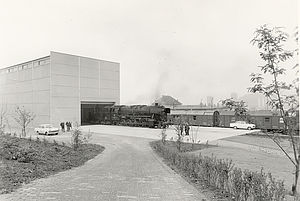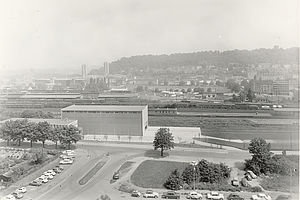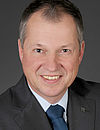
2016-2025: Professor Christian Schindler
Since the beginning of 2016 we were called "Institute for Rail Vehicles and Transport Systems". The new name should make it clear that, starting from the rail vehicle, we are dedicated to the overall railway system, but also to the interfaces to other transport port systems. Under the professorship Schindler, the staff was increased by taking on employees of his former professorship and hiring new staff.
The group Structural Integrity, which deals with component strength, passive collision safety and lightweight construction, was newly created. The previous focus of the IFS, such as wheel / rail interaction, vehicle dynamics and assisted, automated and autonomous driving will be further expanded and intensified.
In addition, existing test stands of the institute were modernized and a new servo-hydraulic vibration test facility is build up.
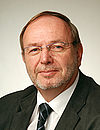
2001 - 2015: Professor Torsten Dellmann
From 2001 until the end of 2015, Professor Dellmann was the head of the Institute of Rail Vehicles and Transport Systems. Prof. Dellmann continued with the ideas for the automated driving following the tradition of his predecessor. The technology carrier ‘CargoMover’ was improved and the vehicle was upgraded to the ‘test vehicle IFS 1’. New tools like computer simulation were used for the research on new mechatronic running gear concepts. Emphasis was put on the optimisation of the wheel-rail contact as research field. Computational models were built and the calculations could be validated with the own rolling test bench. Collaborations with the industry took place in various fields. The institute owned a measuring vehicle, which can be used for test drives up to 200 km/h. The interdisciplinary research project “Galileo above” for the use of satellite-based positioning systems in rail transport was carried out in Professor Dellmann’s time.
The office building was fully refurbished in 2007 and it can be accessed barrier-free ever since.
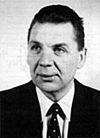
1979 - 2001: Professor Fritz Frederich
Professor Frederich took over the direction of the institute from Professor Nöthen in 1979. Professor Krause and Professor Krettek continued working in their fields. Professor Frederich conducted research mostly in the field of running gears as well as in the area of automated driving. Special focus was placed on the development of innovative running gears. The self-steering single-axle running gear (EEF) for low-floor trams and a bogie with independent wheels (EDF) for high-speed trains were designed. The study of a weight-optimized running gear, named Integral, arose in 1997. This was characterized by the innovative lightweight construction and the integrated functions in few components.
Pioneering work was done in the field of automated driving. The automated signal-guided power car, the self-organizing freight traffic and the technology carrier ‘CargoMover’ were important research projects.
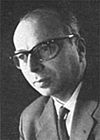
1967 - 1979: Professor Johannes Nöthen
Prof. Nöthen became the head of the institute at the beginning of October 1967. As pupil of Professor Heumann, he put the main emphasis on the field of track guidance and running behaviour. In contrast to his teacher, he considered especially the dynamic field with the aid of electronic calculating devices. Under his direction a model scale test bench (1:5) was constructed, a large contact rolling tester was developed and the existing test bench for the running behaviour was modified to reach 300 km/h. From 1968 onwards, Professor Krause was employed at the institute as an associate professor in the field of material wear. He was already working closely with the industry and carried out related tests at the workshop of the institute. Moreover, a lectureship of analytical processes in vehicles and transport technology was established. The position was occupied by Dr. Krettek, who worked as associate professor beginning in 1973 and as adjunct professor as from 1977. Among others, he modelled and calculated the motion of a vehicle as well as the traction behaviour in the wheel-rail contact.
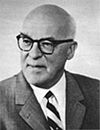
1948 - 1967: Professor Max Fink
In 1948 Professor Fink assumed the direction of the institute (temporarily at first and officially as from 1950), which was named ‘Institute for Conveyor Technology and Rail Vehicles’ (IFS) in 1962. He had returned from the Istanbul University in 1947. A few years prior to this, in 1932, he had founded the ‘Institute of Welding Technology’ of the TH Aachen. In 1937 he was offered a chair at the Chinese Tung-Chi University in Shanghai. In 1957 he received his honorary degree at the Istanbul University. The idea of a new building was first discussed in 1952 and a suitable piece of land at the Aachen-West train station could be soon acquired as a result of intensive efforts. In 1963 the new office and laboratory buildings were constructed at Seffenter Weg, following the architectural style that was typical back then.
The large test hangar with a well-equipped workshop, pit and test benches, as well as a railway siding with a track of about 200 m, was completed in 1966. Under the direction of Professor Fink the main fields ‘conveyor technology’ and ‘rail vehicles’ complemented each other. An intensive teaching activity was developed including external lecturers. This is how Prof. Kurek further developed the ‘track guidance technology’, which had been established by Prof. Heumann at the TH Aachen.
Early years
Few years after the opening of the RWTH Aachen University by the name of 'Royal Nordrhein-Westfalen Polytechnic School in Aachen’ in the year 1870, the technology of rail vehicles was already being handled in general lectures. The first professorship of ‘Locomotive Construction, Railway Machines and Rail Vehicles’, as well as ‘Machine Elements’, was taken over by the retired government-approved master builder Prof. Köchy in 1892. The topic ‘General Transport Facilities’ was additionally assigned to him in 1906 and he lectured until he passed away in 1914. In the year 1920 the chair was offered to Professor Dr.-Ing. Heumann and was soon renamed as ‘Railway Machines and Mass Conveyor Facilities’. After taking over the field ‘Load-lifting Machines’ from Professor Emeritus Nieten in 1938, he renamed the chair as ‘Chair of Railway Machines, Lifting and Conveyor Systems’. Until he was conferred emeritus status in 1946 and beyond, Prof. Heumann investigated the fundamental fields ‘track guidance’ and ‘course of rail vehicles on the track’, for which he was awarded his honorary degree in 1954. After the war, the destroyed rooms were repaired, the remaining documents and books were sorted and the teaching activity was gradually prepared. Since the available number of rooms was insufficient, the institute was relocated to Vaalser Straße.


